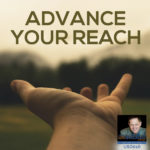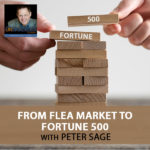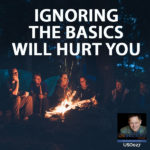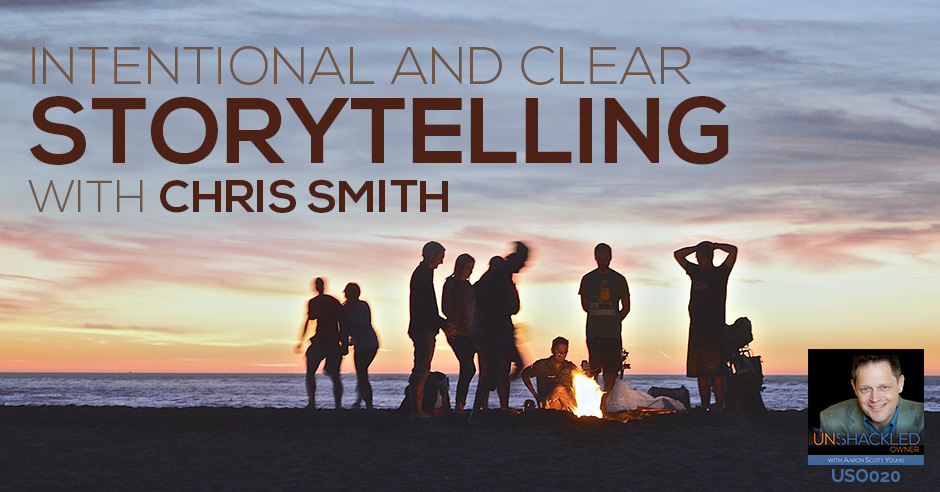
Today, we’re going to be talking with Chris Smith. Chris is going to tell you a little bit about his unusual background. But I’ll tell you, this guy, he comes from a rodeo background. He’s this country boy who’s turned big city stuff on its ear. He’s the creator of The Campfire Effect methodology. A lot of people are sharing with the world that stories are important and you really have to learn to tell your story and you’ll get good at telling your story. But I’ve never met anybody who’s nailed exactly the story to tell to make a huge emotional impact on your listener, on your prospective client, on your employees. This guy has figured out the magic of storytelling. I’m really glad to bring him on here to the Unshackled Owner podcast.
Listen To The Episode Here
Intentional And Clear Storytelling with Chris Smith
Chris, welcome to the show.
Hey, Aaron. Thank you so much for having me. It’s absolutely an honor to be here. If your community is anything like you, which I’m sure they are, then I’m so stoked to be here.
That’s exactly why you’re a perfect guy to have on the program. You are a great representative of what this show is all about. First of all, give us a little idea. Where did you start? How did you come up with the idea of The Campfire Effect? Why did you choose this name? Give us a little bit of your journey.
I am a fifth generation Arizona native. For those of you who don’t know much about Arizona, what that means is my family got into Arizona in 1877, which means we were one of the first families here, early pioneers. My family basically founded Arizona. They were early farmers and ranchers. For generations, I grew up in a farming, ranching, rodeo family. As such, I was raised around cowboy storytellers. I was really fascinated with storytelling ever since I was little. Probably even more than storytelling, what I was really fascinated with was influence; this idea that you could actually influence people. I saw storytelling as a key part of creating influence.

I saw storytelling as a key part of creating influence.
When I was young, I just loved to influence people. I got into a lot of trouble when I was young because of this. I would make up stories just to see if I could get people to do stuff. It was fascinating to me to see if I could get someone to do something because of something I would tell them, I can communicate to them. In sixth grade, at the yearend school assembly when you’re getting ready to promote into junior high, they’re giving all the kids awards for the things they’ve accomplished throughout the year, I got the award for, “Least likely to be found in my seat.” That was the best they could come up with. Because I was always telling stories, I loved connecting with people and I loved telling stories.
Before that, I went on a mission for my church. As part of that, I was sent somewhere where I didn’t know a soul. I had to learn to connect with people for two years and talk to people. I loved it. I really love the idea of connecting with people and creating influence. When I got home, it wasn’t a surprise to anyone that I went into sales. I started off in commercial real estate, which the interesting thing about commercial real estate, Aaron, it’s actually a really, really tough industry to break into. There’s not a lot of human connection or storytelling that actually takes place in commercial real estate.
I’ve rented a lot of space over the years. I’ve had a lot of commercial offices. I think that’s really true. As a matter of fact, a lot of times, the person’s name that’s on the sign, the one who’s supposed to be the great commercial real estate representative, you don’t even meet them. You feel a little bit like you’re getting shuffled through. You’ll be lucky to rent this place or lease this place. I would agree. It’s a coldhearted business.
When I got into commercial real estate, Aaron, I was 22; I’d looked like I was fourteen. I had no credibility, no experience, none of the commercial real estate brokers wanted to train me. I was just a nuisance. I did what I knew how to do. I went out and connected with people. I would connect with them through story. Most importantly, Aaron, I would connect with them first and foremost through their story. If you would ask me the number one most powerful thing I’ve ever learned in storytelling that I believe can transform leadership, sales, performance, is that people connect with us through their story. They’re influenced by our story, but true connection happens when we listen to their story, when we care enough to ask questions about who they are. That came natural to me. I didn’t know anything about commercial real estate, literally. I couldn’t go talk to people about commercial real estate for an hour because I didn’t know enough to carry on a conversation for an hour about commercial real estate. What I did was I just started to get to know people.
Most commercial real estate brokers, when I would go out on an appointment with the senior brokers who were training me, we would sit down in their office and meet them for lunch somewhere, they would introduce themselves, they would sit down. The very first question, most times out of a broker’s mouth was, “How long have you owned the building?” They didn’t take any time to really connect and actually get to know who these people were. I tried to not ask any questions about commercial real estate for as long as I could. I would just ask them, “Who are you? Where are you from? Tell me about your family.” I wasn’t asking them, Aaron, as a tactic. I wasn’t asking them to try and get somewhere with them. I really wanted to know who they were.
Here’s the thing I’ve learned about sales. There are two kinds of sales people. There are people who can just tell the story, I don’t mean that in a negative way because I’m big on stories. But the other person is the one who loves people and knows how to make the connection. In other words, they’ll come and tell their business story, “Here’s who we are. Here’s what we do. Here’s why we’re cool. Here’s why you should engage with us. Here’s why you should buy my stuff.” The other one is the person who loves, loves, loves meeting people and talking to them. Clearly, you are that guy because you had a lot of success, didn’t you?

Even though I knew significantly less about commercial real estate , I could articulate it more clearly. I was really intentional.
Yeah. Within a few months I was one of the top-producing brokers in our office, which was unheard of. Brokers were like, “Who is this guy? Are you paying these people? Are you bribing them? How are you getting this business?” It was so simple that they couldn’t get it. I would say, “I just go out and connect with people.” What’s interesting about this, Aaron, is even though I knew significantly less about commercial real estate than they did, I could articulate it more clearly. When it came time to talk about real estate, I was really intentional. I want to be able to talk about real estate in a way that gives them confidence. My little formula was I would connect with them through their story, really get to know them, then I would tell them a little bit about my story and who I was. Eventually when we got to commercial real estate, I was really clear and succinct and powerful. I could articulate commercial real estate and what our firm offered in a matter of minutes. I just started seeing this little formula. If you can connect with people through their story, then connect with them through yours, and then if you can, clearly and succinctly and powerfully articulate what you do and how you can help them. That’s all I did.
The thing that I really believe about storytelling is it is simple. It was meant to be simple. We’re human beings. Story’s a very human practice and it should be simple. We make it really complex. Long story short, I spent five years in commercial real estate, had a lot of success. I was always looking for something different though. Commercial real estate was way too transactional for me. A friend had been recruiting me into his financial services company for a couple of years, attempting to. We played City League basketball and softball together. He was always talking to me about joining his financial services company. He said, “We’re really, really good at the actual financial planning. We have really high retention because we do such a good job on the servicing of our clients. But we don’t do a good job of bringing in new business. We really struggle going out and getting in new business.” I met with him and I met with his partners. I saw the firm and I was really impressed with the culture and I joined the company. What was interesting is, here I am in a very similar industry to commercial real estate, financial services, very straightforward, service-based, and I did the exact same thing. I went into an industry that I knew nothing about and within a few months I was one of the top-producing advisers there.
At this point you’re 27, 28 years old?
Yeah.
I want people to hear this stuff because some people think they can come right out of the shoot and find their dream. You’re paying the dues right now. You’re going through, you’re learning stuff, and you’re making some money. But you’re perfecting your unique selling proposition of Chris Smith.
My wife said, someone referenced in a talk that we were listening to about the 10,000-Hour Rule, Malcolm Gladwell, The Tipping Point. My wife looks at me and she’s like, “I don’t know how many hours you’ve put into yours but it’s way more than that.” Because people will look at The Campfire Effect and be like, “It’s so amazing what you built.” I’m like, “It only took me about eleven years.” It wasn’t really overnight. I’m moving along, I’m doing well in commercial real estate, got a young family, got some kids. I’m now in financial services trying to really find my way and I did the exact same thing. I didn’t know a lot about financial services but I knew how to connect with people through their story. I knew how to connect with them through mine. Then I knew how to articulate financial services. Again, even though I knew less about financial services than the other advisers, I could talk about it in a really clear articulate way.
One of the benefits honestly, Aaron, is it was actually a blessing that I didn’t know a lot about commercial real estate and financial services because it was almost like my ignorance and being naive a little bit served me because I couldn’t go out and make it too complex because I just didn’t see it that way. I hadn’t been in it long enough.
You didn’t know the features but you could articulate the benefits. Where many people get hung up on the service delivery or how great they are, you stuck with, “Here’s why it matters.” I can even imagine you in commercial real estate, not only hearing their story and telling a little bit about yours, but saying, “Here’s something about this building. Here’s something about different companies that have been here, grown here.” I could totally understand why it would be sexy to feel that you were somewhat connected. It’s like buying an old house in Hollywood that was lived in by Clark Gable or somebody. There’s a need factor that would take just an old house and make it seem like, “I better buy this one because there’s something cool about it.” You’d never know it if nobody told you the story.
I have to ask a question here. You grow up, you’re back from your mission, you go to commercial real estate, you go to financial services. None of this sounds like the rodeo kid. None of this sounds like campfire at all. What was the moment where you said, “I need to start teaching people what I learned sitting around campfire with cowboys?”
What’s interesting is even though I was in commercial real estate and financial services, I would always be inviting my clients to come over and ride horses. One of the things that made me so unique in commercial real estate and financial services was that I was a team roper, I was a cowboy, and I brought that part of me into my work. Especially in financial services, for most of my financial services career, Aaron, I wore jeans, boots, a Pearl Snap nice Western dress shirt and my cowboy boots and one of my belt buckles I’d won. People loved it. People were like, “We’ve never seen a financial adviser like you. They wear shirts and ties and suits. You’re just so real and authentic.” I’m sure there were some people that didn’t want to work with me because of that and that was okay with me.

I could that there was opportunity to be more intentional about how they were bringing the two different brands, the two different stories.
Here’s what happened. We’re doing financial services, and not only do I start to produce pretty well for myself. Probably the greatest blessing that ever happened to me was the financial services company I was with decided to merge with another company. The idea was that they were going to bring financial planning and insurance planning under one roof. I thought, “More for me to sell, more story for me to tell.” We merged; two new companies moved into the new office together. If you know anything about mergers or acquisitions, they’re not always the most intentional from a cultural brand integration. They’re not always the smoothest. There are some hiccups and some things to work through. I could tell with this merge that there was some real opportunity to be more intentional about how they were bringing the two different brands, the two different stories, the two different cultures. There were some areas where we could be much more intentional and really create an impact with it. I went to the owner and I said, “I’ve got some ideas about how to make this merge smoother.” He said, “Run with it.”
What was really cool about it, Aaron, is I almost got to act like a consultant but they couldn’t fire me because I was doing it for free; I worked there. I got to make some mistakes, I got to learn, and I just became fascinated with this idea of this thing that I’d always done just for me, like storytelling and influence and connecting with people. I got fascinated with the idea of being able to do it at a company level, around the company story and the culture and the client experience, as I’ve always been around my own. They gave me full reigns. To Jeremy’s credit, my boss at the time or the owner of the company, he really supported my ideas. I started a mastermind in the firm where we did a weekly mastermind around personal development, which brought these two different sides together on some common ground. They let me bring together the two different brands to create one brand. They let me bring the two different stories to create one story. They let me redesign the office to give a storytelling tour, which is now something I do with all of my clients that have an office where employees or especially prospective clients are coming into.
My two favorite words, Aaron, are intentional and clarity. When we got really intentional and really clear about what we stood for, what we were creating, what our story was, what the client experiences we were going to create, within two years of doing all that, we were bringing in as many assets under management in a month as we had been doing in a year. We didn’t change anything about our products or services. We didn’t change anything about how we did planning. The only thing we changed was the intentionality around the clarity of what our brand stood for, how all of us told the story, and dominating and controlling the client experience. We just exploded. Through that process, I realized this is what I was put on the Earth to do.
If you are doing so well in this industry and you’re kicking tail, how did you have the courage then to step out and start doing this on your own?
You call it courage. My wife might call it stupidity. That’s why I’m laughing. I guess my wife’s much nicer than that. She’d probably call it naivety. When I left commercial real estate, I was doing as great as I ever have been. I had family members telling me, “You are an idiot if you leave commercial real estate. You’re on the path to becoming a partner. You can be getting into the commercial development within a couple of years.” I was in my mid-20s and had a couple of $200,000 income a year, in my mid-20s. People were like, “You’re crazy.” But I just had never been afraid to go after what I thought was more aligned. Looking back now, I even tell my wife sometimes, “Why did you let me do some of the crazy stuff I did? You should’ve been more pragmatic.”
I left commercial real estate and went into financial services. When I was in financial services, because of the growth, they gave me 10% ownership in the firm. Not only did we have all of this growth, I was a 10% owner. Most of the hard work was behind us. That’s when I realized I’m going to go out and start my own thing. I came home and I told my wife. At this point she had given up on me, she was like, “I know.” At the same time, Aaron, my wife was my biggest advocate. That’s another thing I always tell people, is you got to have someone that believes in you. If you just have one person that believes in you and sees potential in you, that can mean everything. My wife has always been that for me.
When you started out, did you have some runway? Did you have some money put away and you said, “Now, we’re going to try this entrepreneurial thing.” Did you end up having to eat beans and max out credit cards? What happened to start the process? How did you get those first clients? What was the entrepreneurial leap?

I was meant to go help people create intentional influence around their brand and their story and their culture.
Even though we were experiencing a lot of tremendous growth over those two years in the financial services company, we were growing. We were paying ourselves bare minimum, putting most of it back into the company. I didn’t have much of a stake at all. But I knew that what we had just done with that company, I knew there was a framework there. My favorite quote is by Mark Twain, “The two most important days of your life are the day you were born and the day you find out why.” I, through that experience, knew this is why I was put on this Earth. I was meant to go help people create intentional influence around their brand and their story and their culture.
I went to the owner of that company, Jeremy, and of course he wasn’t happy to have me leave, but he was very supportive and he said, “If you’re going to leave, I want to become your first client.” That helped a little but what they were paying me wasn’t enough. We just took a big leap of faith. There were months where we were buying groceries off of our credit cards. We didn’t have the money in the bank to buy groceries. Not a lot, but there were some months where we were, “Do we pay the utility bill or do we get groceries?” I don’t know how or why but we just always figured it out. I was just committed.
The thing I did, and I recommend this to a lot of people, I’m not saying you have to do this, but I knew that I wanted to put as many people as I could through my framework because I had a little bit of framework there. I knew that every time I took someone through that framework it would get better. Rather than holding out for a $5,000 or $10,000 workshop, I started going to people immediately and saying, “Look, I have a framework. Here’s the success I’ve had with this framework. Here’s the company I just took through it, which was this financial services company. I’m just going out on my own to do this. Here’s what I would normally charge to take you through the framework. However, I’m willing to do it for you at no cost.” I was really intentional about never telling someone that I would do it for free. I said, “I will do it at no cost but in return I want your honest feedback about how we can improve it. I want a video testimonial and I want a referral.”
How long ago was this?
Probably two and a half, three years ago.
This is current, this is recent.
Yeah.
People started letting you do this, then what happened? How did you start making money?
What’s interesting about it is every time I take someone through it, I would gain more confidence. I was like, “This really works. This didn’t just work for the financial services company. This really works.” Every time I took someone through it, one, I got better and the methodology got better because I would come back and I would tweak it and I would use their feedback. Then I got to the point where I was confident enough to no longer tell people, “Here’s what I normally charge but I’ll do it at no cost.” I just got to the point where I said, “Here’s what I charge.” I started small. I used to do a two-day workshop, Aaron, with follow-on coaching for $3,000.
What was the turnaround?
Just the results I saw people getting. People were coming and doing this two-day workshop with me, not after even the follow-on coaching, just after the two-day workshop, people were saying, “Chris, I have more clarity around what my brand stands for and how to tell my story. I have more clarity after two days than the entire time I’ve owned my company.” Some of these people have been in business ten, fifteen, twenty years. I was like, “Wow. I’m on to something.” I even had clients tell me, “You should charge more for this. You are robbing yourself charging $3,000.” Then I doubled my price to $6,000. I had a two-day workshop for $6,000 and the follow-on coaching. Then the next thing I did was cut the follow-on coaching. I did one follow-up coaching call. Then from there, I raised it as I continue to get results. The thing I say, Aaron, is that if you go and do this, one, your framework or your process, whatever you’re taking people through, it will improve or it should improve every single time you take someone through it. Two, you’ll improve and your confidence will improve. Then I eventually went from $6,000, then the big leap for me was I doubled it to $12,000 for a two-day. After a while I went to $15,000 for a two-day. Eventually I just cut the second day and I did $15,000 for one day.
You’ve been doing this for two and a half years. Has there been a speed bump along the way? Was there a place where you said, “I thought this was going to work but it didn’t work?” Or has it all been just blue skies or smooth sailing or have you had any bumps in your entrepreneurial journey?
For me, most of the speed bumps came at the beginning. Once I got really committed and I started doing my workshop, it’s been full steam ahead. I’ve had some hiccups but the real bumps for me were after I left the financial services company, Aaron, and just said, “I’m going to do this.” I had a lot of doubts and really second-guessed myself. What I did was I started The Campfire Effect one foot in, but then I kept one foot in and I was going and consulting other businesses with their business, trying to help them get their business off the ground and maybe take a little piece of equity or take some of the upside. Because to me, it was almost less scary helping someone else with their thing than it was to focus full-time on mine. Does that make sense?
Yeah. Here’s my question. When you started increasing your prices from $3,000 to $6,000, $12,000 to $15,000 one day, did you notice you had to change your audience significantly? Did you have to go look for bigger companies who could understand the value of telling their story? Or did you end up having people that were coaches and solopreneurs and those sorts of things that are looking for a silver bullet? How did you make those jumps? Did you have to change your audience?

If people are committed to work with you, they will find the money. They will go out and create it.
I didn’t have to change my audience a lot. What I found, Aaron, is that if people are committed to work with you, they will find the money. They will go out and create it. I certainly saw that there were people like solopreneurs that were just getting started or maybe startups that weren’t going to be able to afford that, which is why I then later created an online course. I created a group two-day workshop, which is less than half of that price. But from the market I started out with, I didn’t change my market or my focus a whole lot. What’s interesting about that, Aaron, is not only did I go from doing something that I used to do in two days with literally four weeks of coaching, down to one day, I believe that I now deliver more value in one day than I used to with two days plus four weeks of coaching. Most of us launch with an initial process or a framework or a methodology, but we’re not constantly looking at how to improve it and make it better so that we can get better results faster for people.
Here’s my thing for you. I love this story because this is a big deal for a lot of people that are listening, that there’s an issue about they give up too quickly. They think, “I’m not exactly in my groove yet, maybe I shouldn’t be doing this.” What I love is that you became not only great at delivering but you became a real student of your process and you were almost like a scientist of your process and dug down and improved, improved, improved and you saw the benefits so you increased the price. I think I’ve known you for at least a significant chunk of this elevation of your personal brand and elevation of your prices. I think that that’s a big takeaway for people, is you should find the sweet spot where you can get your ideal client and get the money that you really deserve and that you need for those days.
By getting clear on who the right kind of client is, what you’re doing, you’re not getting broad, you’re getting really narrow in what you offer, you actually can make more money, have greater personal joy in the work you do, and you don’t have to be so busy all the time because you’re just delivering at a high level what you’re great at. I love that whole idea of intentionality and clarity really works with this ability to charge a pretty high daily rate to take people through a process that they might think of as being a soft service; learn to tell your story. How do you deal with keeping people or exciting people into this idea of, “What is a soft service?” It’s not definitely increase your sales process by 10% or we can get your SEO ranking up high or we can do whatever.” How do you deal with that when people are first meeting you and listening to your story?
People ask me that all the time because it is a soft service. The thing I tell people though is I start asking questions. I really want to know where they’re at in their business and where the gaps are in their business. So much of this, Aaron, is your belief and the conviction around that belief. I believe that storytelling is the most powerful way for you to grow your business, improve your culture, increase sales, and drive performance. I tell people that. I don’t see storytelling as a marketing exercise. I don’t see storytelling as a branding activity. I don’t see storytelling as an advertising tool. Those are outcomes. Story to me, it is the foundation for everything you are as a company. Your story should influence your culture. You should have a culture built around the origins of your story and how amazing your company is and the roots of the company and what it’s gone through. Your leadership should be driven by your story. Your leadership should all be aligned to the same story, what they stand for as a company and what each of them stands for as leaders. Your brand should be driven by your story, your culture, and performance. I see storytelling as the foundation for everything in your business.
Tell the audience, what are some of the points that make a good story? What actionable tips can you give some people right now so they can get a little taste of what you’re talking about? Because the outcome that you’re describing is fabulous, but how could people start to understand that? How do they start to look at their life or their history in a context that would give them some of what you’re talking about?

It is not what we do that makes us unique, it’s how we do it.
I want to touch on this. I teach a story formula that I created called The Five Secret Forces of Storytelling. It’s these five forces. I want to teach you the one I believe has the most impact on all of my clients. It’s the one that has the most impact on me. It is the essence of what we’re talking about, Aaron, which is, “How did I go from charging $3,000 for a two-day workshop with four weeks of coaching to charging $15,000 for a one-day workshop and getting better results for my clients?” It’s the fourth force of my storytelling formula, which is how you do it. Here’s something that I’ve come to recognize. It is not what we do that makes us unique, it’s how we do it. Aaron, I know you do a few different things but if you had to say what industry you’re in, what would you say? Or give me one of your industries.
I would say I’m in the fortress building business, but what we actually do is we help companies get a solid foundation and then I show them how to build the walls up around that. Whatever they want to do inside that building, it’s up to them. But I’m going to show them the principles that are going to make them into a mature company. Industry, I guess you could call it business consulting. Although, I never think of it that way. I’d like to think of my industry as more like helping people get out of startup mode and into grown-up mode. Again, I don’t know how to put that into a box.
Let’s just call it management consulting, which is not, but I get it. You’re helping businesses grow and you’re helping them set the foundation. What I would have you see, Aaron, is that’s not what makes you unique. Because even though you know that you do it differently than everyone else does, there are a lot of other people, management consultants, that could technically claim that they’re helping people do the same as like what you’re doing. Does that make sense?
Sure.
We’re helping businesses get their foundation. We’re helping them get aligned. We’re helping them get clear. We’re helping them grow without debt and do it in a way that’s not constrained so they can be unshackled. What I’ve recognized is the same as me. There are thousands of people that can claim that they help companies with their brand and their story. All of that lives in the “what we do.” It’s not what we do that makes us unique. It’s how we do it. The fact that you help businesses, Aaron, isn’t what makes you unique. It’s how you help them. How you help them is different than how anyone else will ever help them because there’s no one else that’s like you. There’s no one else that’s had your exact same path, your exact same journey, your exact same experiences, your exact same struggles. If you look at the culmination of your life, Aaron, and your journey and all the struggles and challenges, if you take all of the wisdom that’s come out of that, you could really say that that is a framework. It’s a process. Whether you intentionally look at it that way or not, you have a process and a framework that you now help companies with and you help owners become unshackled. You would have never come up with that process or that framework had it not been for your own life’s experiences. Correct?
Agreed.
That is what makes you unique. Whatever that process is, whatever you call it, and by the way, for our audiences, if you don’t have a name for your process, your framework, your methodology, it’s a great opportunity. Let me dive further into this. Just go look at most people’s websites. Look at your own website. Pay attention to how much of the content on your website is talking about what you do, which anyone in your industry, any of your competitors could probably come and take their logo, swap it out for yours and it wouldn’t make any difference. It’s all industry-related talk, what we do. Aaron, what do you think our clients want to know more than anything from us?
How we can help them make their life easier, how they can get to their destination faster, smoother, cheaper.
You used two different examples. What word did you use to start both of them with?
We’re going to show them how.
How we can help them. That’s what people want to know more than anything. If you really think about it, regardless of the industry you’re in, there are two questions all of our clients have: Can you help me, one. Two, how are you going to help me? Go look at most people’s websites, again, very little of the content is us answering those two questions. Very little of it is us telling them that we can help them. Secondly, very little of it is us actually telling them how we help them. We’ll spend forever talking about what we do. What I always say is we spend the most of our story talking about what our clients and customers want to know the least, which is what we do. We spend the least amount of time talking about what our clients and customers want to know the most, which is the fact that we can help them and how.
That’s how you lose their attention.

If you name it, you actually have a chance to own it.
I just believe that every single entrepreneur, every single company, whether they recognize it or not, has a proprietary process, framework, methodology, system, whatever you want to call it, that they’ve created. It is how they get results for their clients. The missed opportunity is most of them don’t see it like that. They don’t see it as very unique. They just go, “This is just our process. This is just what we do. It’s how we do it.” But it’s unique. You came up with it because of your experiences, your own struggles, your own challenges. If you name it, you actually have a chance to own it.
Here’s the point I’m illustrating with all of this, Aaron. When I started my two-day workshops for $3,000, I had a framework. It was loose, but because I named it and I called it The Campfire Effect and I named the three pillars of it, even though it was loose, I could actually see my framework, which meant I could improve it because I could see what it was. Every time I took someone through it, I could go back and look at my framework and I could say, “When I was just working with this company, when I was taking them through the first pillar of my framework, the Spark, this piece went really, really good and this piece, I need to modify this. Then when I was taking them through the Fuel, my second pillar, they got lost here. I need to improve this.” Every time I took someone through my three pillars of my methodology, I would come back and look at it. You can’t improve what you can’t see. If you don’t have a framework or a process that you’ve labeled and you’ve named out the steps and you can name it, how can you improve it?
You can’t. You absolutely can’t. First of all, I’ve never seen the full process in force, is it really the process of building a fire?
Yeah. Mine is the spark, the fuel, the oxygen because those are literally the three things you need to start a fire and continue to burn. I named my three pillars: the Spark, the Fuel, and the Oxygen, because if you take any one of those three things away, the fire goes out. Just like in a culture and a company, you take any one of these three elements out, you’re not going to have that fire that’s burning, that’s glowing that people are attracted to. I’ll just tell you mine really quickly because I can do it in just a few minutes. Someone ever asked me, “Chris, what do you do? How do we work with you?” I would say, “What I do is I take a company through my proprietor and methodology, The Campfire Effect. The Campfire Effect has three pillars: the Spark, the Fuel, and the Oxygen.”
The Spark, that’s where I work with you, the owner and CEO, and maybe a couple of people from your executive team. You come out and you spend a day with me. What we do in that day is I take you through my methodology, my framework. I take you through my brand journey, my brand framework, my brand DNA, and my brand vision. At the end of that one day, we’re going to have built out your story, using my proprietary story formula, The Five Forces of Storytelling. We’re going to have built out the DNA and the vision for your brand. The outcome of that is you will have your story in a Google Doc plus the audio recordings of me telling your story and you will have more clarity around what your brand stands for and how to tell your story in one day for the entire time you’ve been in business. That’s my promise. That’s the Spark.
Now, the second pillar of my framework is called the Fuel, because I believe that your team is the fuel to your fire. It’s great if you the CEO or you the owner of the company come out and spend a day with me, but if we don’t get your team on board, if we don’t get your team to catch fire with us, it’s never going to go anywhere. In the spirit of believing that your team is the fuel to your fire, what we do in the second pillar is I actually work with your team to help each of your team members see how their personal story is actually aligned with the company story so they can see a greater purpose in that alignment. They can see why they’re actually here. In my experience, when we take your company through the fuel, your team members will be more connected and more on fire about the purpose of your company and the brand and more aligned than in the history of your company.
Then the third pillar is the Oxygen. That’s where we start to breathe life into your brand and your story. We start to push it out in the marketplace. This is where we look at your marketing, your branding, your hiring process, your leadership. We look at everything that your story is going to touch externally and we see where the misalignments are so that you can have an internal brand and an external brand that’s completely in alignment with one another, so that everything you’re doing in marketing and branding is aligned with what you’re doing in terms of your story.
To our audiences, this is why I wanted Chris to come on. I hope you just got that too. I’m hoping that at the end, because I don’t know what the answer to this is going to be, but I’m hoping there’s going to be a way for you to begin your relationship with Chris, because what he just gave you was gold. If you’re like me, all you’re doing is wanting to go, “I want more information.”
Chris, at the last part of this program, we always like to ask just a few questions that really give people keys that they can learn from you about how they can be more successful, how they can become unshackled. I call it the Golden Keys because these are the keys to start to free people from the bondage that a lot of times they create for themselves and their business. The first question I want to ask you is, what book or other training has really been influential, pivotal for you and really has inspired you? What could you recommend to people?
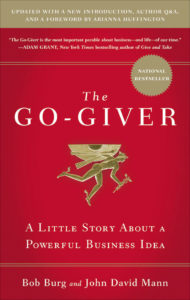
The Go-Giver;
Book by Bob Burg and John David Mann
I would say there are really two. The book that really, I would say, changed my life, everyone has that one book. For me, it was The Go-Giver. The Go-Giver really is this idea that success we have in life is linked to how much we’re willing to give and serve. It really had a massive impact on me and it has an amazing story in the book. I’m biased to stories. The Go-Giver really had a massive impact. And then Essentialism. The subtitle of the book Essentialism is The Disciplined Pursuit of Less. One of the things that we struggle with as entrepreneurs is, it’s pretty tough a lot of times to nail down what our process or our framework is so that we can begin improving it because we’re chasing so many things and we’re sometimes spread so thin, we’re so distracted. Essentialism was powerful for me to get really, really clear and focused on what it was that I was actually creating and building so that I could stick with it and actually improve it.
Both great books. Neither of those has ever been brought up by any guest.
If you could go back in a time machine and change something, not do something, just some different decision, what would that be?
When I was first getting started in my career, I would have taken the same amount of effort and energy I put into focusing on what I wanted to have: money, cars, homes, time. I would’ve redirected that energy into who I wanted to be.
It goes to show why people connect with you and why they want to be involved with you and why you’ve had a quick rise in your personal business. Let’s focus on being the best person we can be because people will be attracted. That’s like a tractor beam to pull people in if you’re the kind of person that they feel better when they’re around you. Do you have a favorite quote?
I think it’s really that Mark Twain one that I shared earlier, “The two most important days in your life are the day you’re born and the day you find out why.” To me, that quote really supports this idea of who do you really want to be. I spent way too much of my life focusing on what I wanted to have and it wasn’t until I got really clear on who I wanted to become and then only lived my life in alignment with that that I felt I started to really experience the impact that I’m capable of.
You’re making a huge impact. Chris, do you have any parting words of wisdom to these entrepreneurs? We’ve got people that are regular listeners to the program, from people who are working a job who might want to jump out and start something to people who are running very, very successful businesses; $20 million, $50 million, $100 million in sales companies that I know who have written to me and who are listening. What parting counsel would you share with them? Tell us how can people reach out and connect to you.
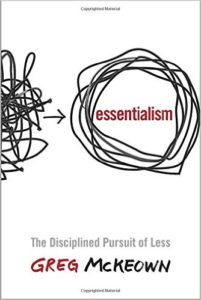
Essentialism: The Disciplined Pursuit of Less
Book by Greg McKeown
I’m going to speak to both. To the established business that has a successful business, again one of the most powerful things that I’ve been able to help companies with is when they can start to identify the thing that makes them unique with the ‘how they do it,’ their process. They can put language around that and name it. It creates so much alignment amongst your leadership team, culturally. It empowers your sales people with something to go out and actually put language to the thing that is what makes you unique; your process, your framework, your methodology is a gift. It’s a gift to your marketing and branding people. It’s just amazing. I would really encourage you, established businesses; start to identify the how, not what you do. That’s easy. But how do you do it in a way that’s unique in your industry and can you put language around it? Can you brand that? Can you brand the steps of it? It will create a lot of alignment and clarity in your organization.
To the people maybe that are working a job and have the entrepreneurial itch and just don’t quite know how to bridge the gap, the power is in the deciding. I think there’s a lot of people working in companies that are just waiting for the stars to align or they’re waiting for the right circumstances or they’re waiting for it to be a convenient time, and then they’ll decide to go be an entrepreneur. I just don’t believe it works that way. I don’t think they’ll ever be a convenient time, at least from what I’ve seen. To me, the power is to make the decision that you’re going to leave. If you want to be an entrepreneur, then decide, and that doesn’t mean you have to do it now. What I find is that most people never decide, so they sit and they think, “I really want to go out and be an entrepreneur but I don’t know how I would do it. I don’t know how I would make it happen.” They never make the decision but they just mentally punish themselves with, “I want to do it but I’m not going to do it. I haven’t decided to do it.” What I found is, it’s easier just to decide to do it and then at least now there’s a possibility you could actually figure out how. Just make the decision, say “Yes.” Then look at the possibilities of what you would have to do to make it a reality. That’s what commitment looks like. The power isn’t in waiting for the right circumstance, the power is in you deciding to do it and then you figure it out.
Great words of wisdom. Tell us how we can reach you. Tell us how we can plug in to you. If people are fascinated with this, how can they work with you? What’s the process and what’s the best way if they have questions?
We’ll actually put a link up for you, TheCampfireEffect.com/Unshackled. We’ll have our eBook up there, The Five Forces of Storytelling. We’ll get that put up there for you. It’s a guide of how you can start thinking through your story using this formula that we created.
I’m going to download it. I think my audience ought to go download it. We’ve all had a great about 50 minutes of listening to Chris Smith. This guy who grew up riding horses, team roping, being a cowboy, decided to chase money, realized that the money was really made in telling a great story. Now helping people all over the world to really crystallize, not just what they do but how they do it through really understanding their story and their history. Chris is one of the finest guys I’ve ever met. I encourage you to go and learn lots more about him if you get a chance to hear him speak. He gives a phenomenal presentation. Go to the link or you can go grab and download his book.
Thanks for being here with us on another episode of the Unshackled Owner podcast where we’re helping you to learn how to build a business that will work harder for you than you have to work for it.
Links Mentioned
- The Campfire Effect
- The Tipping Point
- The Five Forces of Storytelling
- TheCampfireEffect.com/Unshackled
- Essentialism; The Disciplined Pursuit of Less.
- The Go-Giver
- AaronScottYoung.com
- The Unshackled Owner Twitter
- The Unshackled Owner Facebook
- Aaron Scott Young LinkedIn

